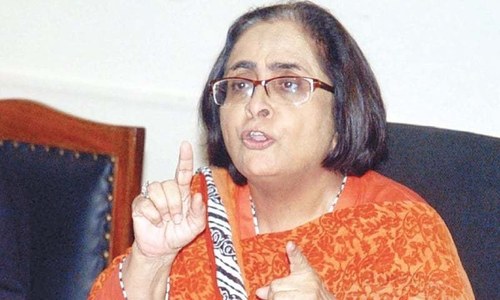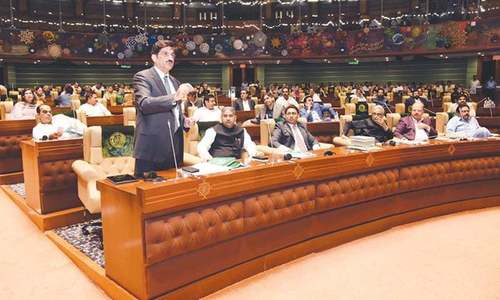KARACHI: The Sindh cabinet citing “defective admission policy of the Pakistan Medical Commission (PMC)” on Thursday decided to lower the required passing percentage for the MDCAT-2021 from 65pc to 50pc to qualify for admission to colleges and universities in the 2021-2022 session.
The decision would not only provide an opportunity to candidates from Sindh to seek admission to the medical and dental colleges/universities of the province, but would also facilitate the process of filling vacancies, Chief Minister Syed Murad Ali Shah said while presiding over the cabinet meeting at CM House here on Thursday.
The meeting was told that after replacing the Pakistan Medical & Dental Council (PMDC), the National Assembly had passed the Pakistan Medical Commission (PMC) Act with the objective of regulating medical education and profession; and to recognise medical and dental qualifications in the country.
Health Minister Dr Azra Pechuho told the meeting that Section 16(f) of the PMC Act-2020 authorises the commission to conduct all examinations whereas Section 18(3) provided that “The admission to medical or dental programs conducted by public colleges is to be regulated as per policy of provincial governments ... and “the marks obtained by a student in MDCAT conducted by the Authority shall constitute a minimum of 50 per cent of the weightage for the purposes of admission in the public colleges”.
‘PMC’s defective admission policy bound to cause shortage of doctors in future’
“Hence in PMC Act-2020, there is no mention of pass or fail percentage in the eligibility criteria for Medical and Dental College Admission Test (MDCAT). Likewise, there is no mention of a minimum compulsory passing score, which at present is 65 per cent,” she argued.
The health minister noted that the PMC conducted computer-based MDCAT-2021 exams in Oct 2021, based on federal curriculum on different dates. “The test from federal curriculum puts Sindh students at a disadvantage which resulted in low percentage of passing students,” she said, and added that last year, the passing percentage of MDCAT test was 60 per cent whereas this year, this requirement had been unilaterally increased to 65 per cent. “As a result, the total number of students who qualified last year was 8,287 (32.8pc) while those who qualified in MDCAT 2021 is 7,797 (22.4pc), and the total number of seats in medical and dental colleges (public and private) in Sindh is 5,490,” she pointed out.
The minister informed the meeting that last year, with the passing percentage of 60pc, 8,287 students in Sindh passed the exams and 2,900 of them got admissions in the public sector colleges. “Of the remaining 5,387 students, about 800 got admissions in the private sector colleges. The remaining 4,587 were not able to get admission, mainly due to affordability issue, leaving about 1,800 seats vacant,” she said.
Dr Pechuho said that the private sector acquired 1,300 candidates from other provinces while 492 seats remained unfilled. “With this growing trend of fewer admissions, Sindh will face a severe shortage of about 10,000 doctors in the next five years,” she said.
The chief minister said that WHO recommended one doctor for 850 people whereas Sindh had one doctor for 3,200 people. “Hence this gap of availability of doctors would further worsen the situation in future if it persists,” he said.
Keeping in view the situation, the cabinet decided to lower the passing percentage in MDCAT 2021 from 65pc to 50pc. The weightage of MDCAT-2021 in overall merit would remain the same as prescribed under the PMCAct, according to the decision.
Buses procurement
Transport Minister Awais Qadir Shah told the cabinet that his department had signed an agreement with the National Radio & Telecommunication Corporation (NRTC) for the procurement of 250 diesel hybrid buses in October.
It pertained to the Sindh Intra-district Peoples Bus Service Project for Karachi, Hyderabad, Sukkur, Larkana, Mirpurkhas and Shaheed Benazirabad and the procurement would be done through the Sindh Mass Transit Authority.
He said that the construction of a depot, operation and maintenance of the vehicles and revenue collection would be undertaken by private operators.
The chief minister directed the minister to make the buses operational latest by April 2022. The cabinet approved the agreement signed by the transport department with NRTC.
Thalassemia Foundation
The provincial cabinet on the recommendation of health department approved creation of ‘Sind Thalassemia and Hemoglobinopathy Foundation (STHF)’ to work for the promotion, development and financing of Thalassemia and hemoglobinopathy centres across the province for prevention and treatment of the disease.
The foundation will have an 11-member body under the secretary health to govern the foundation.
Amendments
The provincial cabinet on the recommendation of the population department discussed and approved amendments to The Sindh Reproductive Healthcare Rights Act, 2019. Under the amendment, premarital consultation on family planning has been made mandatory for registration of Nikah.
Telehealth & self-care and maternal and perinatal death surveillance and response have also been made part of the bill.
Through an amendment to the Dow University of Health Sciences Act-2004, the Sindh Medical College section was abolished from the Act as the SMC has been established as a fully-fledged university and similar other amendments were approved and referred to the provincial assembly.
Khairpur Special Economic Zone
The provincial investment department told the meeting that the chief minister had already approved creation of Sindh Economic Zones Management Company (SEZMC) as an administrative agency of the Khairpur Special Economic Zone, established on an area of 140 acres as the first Industrial Park with the SEZ status.
On the request of the investment department the cabinet authorised the SEZMC to take over as administrative agency of KSEZ and immediately accommodate investors/zone enterprises.
The cabinet also abolished the steering committee working under the Sukkur commissioner for allotment of plots and infrastructure development.
On the request of CM’s Adviser on Agriculture Manzoor Wassan, the chief minister directed SEZMC to complete all the ongoing schemes of the zone on a priority basis.
Published in Dawn, December 3rd, 2021















































